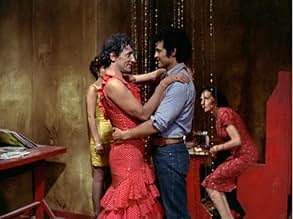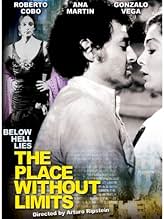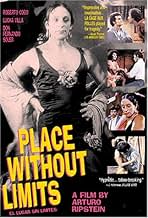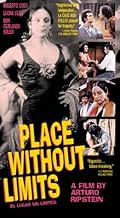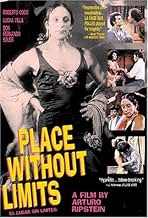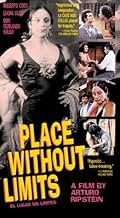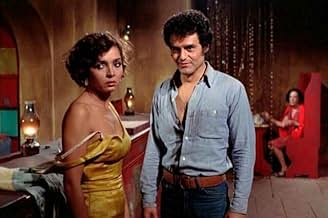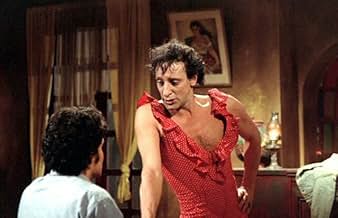CALIFICACIÓN DE IMDb
7.5/10
1.8 k
TU CALIFICACIÓN
El honor familiar, la codicia, el machismo, la homofobia y los sueños chocan en un pueblo Mexicano. Don Alejo quiere vender el pueblo para obtener beneficios, sólo necesita comprar un prostí... Leer todoEl honor familiar, la codicia, el machismo, la homofobia y los sueños chocan en un pueblo Mexicano. Don Alejo quiere vender el pueblo para obtener beneficios, sólo necesita comprar un prostíbulo para poseer los edificios y cerrar el trato.El honor familiar, la codicia, el machismo, la homofobia y los sueños chocan en un pueblo Mexicano. Don Alejo quiere vender el pueblo para obtener beneficios, sólo necesita comprar un prostíbulo para poseer los edificios y cerrar el trato.
- Dirección
- Guionistas
- Elenco
- Premios
- 8 premios ganados y 4 nominaciones en total
Marta Aura
- Emma (hermana de Octavio)
- (as Martha Aura)
Francisco Llopis
- Cliente anciano
- (as Paco Llopis)
María Teresa Olmedo
- Rosita (Prostituta)
- (as Tere Olmedo)
Hermanas Gómez
- Hermanas Farias
- (as Hnas. Gomez)
Opiniones destacadas
I had seen other Arturo Ripstein films before this one: you can say Ripstein films are unusual in their scripts and some might say downright weird in the treatment of their themes, but they are always hypnotic to watch. Their plot is often, well, a train wreck: you feel the tension and you know nothing will end well.( Tennessee Williams plays function within a similar mix of explosive passions and imminent doom). Everything in a Ripstein film is baroque: dialogues, themes and colors. This movie is all that, and more, because it introduces us to a rich cast of characters in a restricted setting, and there are significant political undertones to the tale. But the most fascinating part of this film is of course this gentle transvestite who never once drops the pretense that he is a woman, in public or in private ( The actor who plays him/her is AMAZING, and remarkably believable against all odds.) I think it is a solid story -with a great soundtrack of old Mexican songs- that has a lot to say about machismo and the plight of women in a society that values only male "qualities".
Family honor, greed, machismo, homophobia, and the dreams of whores collide in a Mexican town. Rich, elderly Don Alejo is poised to sell the town for a profit, needing only to buy a whorehouse to own all the buildings and close the deal.
The themes of this film are quite interesting, and in someways ahead of their time. We have a very blunt look at homosexuality in 1978, and based on a book from 1966. And, in a way, it is something of a multi-cultural film because the author, José Donoso, wrote the book in Chile but was later a resident of Mexico, Spain and Iowa -- his personal papers are in the University of Iowa archives.
I am not sure if a good edition exists. The one I saw was a bit rough, and this is the sort of film that could really use a new audience and some love from Criterion.
The themes of this film are quite interesting, and in someways ahead of their time. We have a very blunt look at homosexuality in 1978, and based on a book from 1966. And, in a way, it is something of a multi-cultural film because the author, José Donoso, wrote the book in Chile but was later a resident of Mexico, Spain and Iowa -- his personal papers are in the University of Iowa archives.
I am not sure if a good edition exists. The one I saw was a bit rough, and this is the sort of film that could really use a new audience and some love from Criterion.
This is an unusual film. Above all because it was made in Mexico and in 1978, at a time when Fassbinder was still shocking Europe with the amoral way in which he treated sexuality in his films. It seems to have exerted a strong influence on this Mexican film.
The work is interesting not only for the courage, for the time, to approach the gay theme, but above all for the approach of the psychological repression resulting from machismo.
This not only prevented homosexuals from assuming their sexual orientation, but also pushed them towards a path of violence, against themselves and against those who, by assuming their homosexuality, revived the demons of their repressed sexuality.
An amazing film.
The work is interesting not only for the courage, for the time, to approach the gay theme, but above all for the approach of the psychological repression resulting from machismo.
This not only prevented homosexuals from assuming their sexual orientation, but also pushed them towards a path of violence, against themselves and against those who, by assuming their homosexuality, revived the demons of their repressed sexuality.
An amazing film.
Considering that this film was made in 1978 when no one - especially no one in Mexico - was making films about gay men, this film is remarkable for the way it presents a critique of macho culture. La Manuela, played brilliantly by Roberto Cobo, doesn't want to be a man because she doesn't want to be a "bruto," an animal. Pancho and his brother in law, Octavio, represent everything that's wrong with Mexican men. They are obsessed with appearing "manly" in the eyes of the world. They treat women like objects, they are violent, and they like to control other people. Pancho is especially pathetic because he is obviously attracted to la Manuela but can't admit it. On the other hand, la Manuela is very honest and open about who she is and what she wants. She doesn't care if people make fun of her and call her names. She is kind, supportive, and in decisive moments, brave. In case you're thinking this is a male-bashing film, it's not. Don Alejo, the aging cacique (boss) of the town is an old fashioned patriarch who has his flaws, but he is not threatened by men like la Manuela. He doesn't pass judgment on people and he recognizes wrongdoing when he sees it. He suggests that there are other ways to be a man in Mexico, and that people like Pancho and Octavio are threats to society. The relationship between la Manuela and her daughter, Japonesita, is sweet and touching, like the mother and daughter roles in a 1940s melodrama, but with a modern twist! Although la Manuela sometimes acts campy and parodies female behavior, it is clearly just part of the spectacle or show. When she's not on stage, she's down to earth and practical, like any of the other "girls" who work in the brothel. This film shows the seamy side of life in a small town, but ultimately suggests that the people who live and work in the brothel are more honest and sincere than those who belong to the so-called "respectable" outside world. Roberto Cobo is perfect in the role because he's not beautiful or feminine looking, but he knows how to seduce with words and gestures. The final "dance of the kiss" is hypnotic, and it's easy to forget that he's not a "real" woman as he dances for Pancho. Running like a thread through the whole film is a commentary about how life in Mexico is changing and how small town life is disappearing. It's a great film, well worth seeing, the best film coming out of Mexico in the 1970s, without a doubt.
Unbelievably shoddy. Slow: Tells, not shows, with endless dialogue, much of it plot exposition of the past. Characters are caricatures, flat and two-dimensional. A flashback comes unannounced, indistinguishable from the present. The murder, when it arrives, has been broadcast from the beginning, robbing it of all suspense.
Director Ripstein tries too hard to be "transgressive," a bad boy. Film revels in grit and grime for the sake of grit and grime - it's too cult. His comparison to Marlowe's Faustus, made in the inscription at the beginning, is a stretch and pretentious, to say the least. The title derives from this.
Director Ripstein tries too hard to be "transgressive," a bad boy. Film revels in grit and grime for the sake of grit and grime - it's too cult. His comparison to Marlowe's Faustus, made in the inscription at the beginning, is a stretch and pretentious, to say the least. The title derives from this.
¿Sabías que…?
- TriviaThe film was selected by Mexico as its entry for the Best Foreign Language Film at the 51st Academy Awards.
- ConexionesReferenced in El infierno (2010)
- Bandas sonorasFalsaria
Performed by Pepe Arévalo y sus Mulatos
Selecciones populares
Inicia sesión para calificar y agrega a la lista de videos para obtener recomendaciones personalizadas
- How long is The Place Without Limits?Con tecnología de Alexa
Detalles
Contribuir a esta página
Sugiere una edición o agrega el contenido que falta

Principales brechas de datos
What is the English language plot outline for El lugar sin límites (1978)?
Responda
